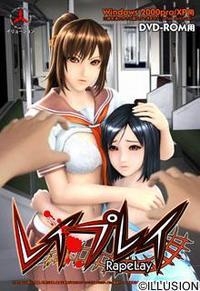

| RapeLay | |
|---|---|
 | |
| Developer(s) | Illusion Soft |
| Publisher(s) | Illusion Soft |
| Platform(s) | Windows |
| Release |
|
| Genre(s) | Eroge |
| Mode(s) | Single-player |
RapeLay (レイプレイ, Reipurei) is a 3D eroge video game made by Illusion, released on April 21, 2006, in Japan. Compared to Illusion's previous games, the main story is shorter, it features an improved 3D engine and is mainly played through mouse control. The game centers on a male character who stalks and rapes a mother and her two daughters. Three years after its initial release, the game garnered international attention and controversy for its content, resulting in it being banned in several countries.
RapeLay is played from the perspective of a chikan named Masaya Kimura, who stalks and subsequently rapes the Kiryū family (a mother and her two daughters). After the player finishes raping all three women, they unlock Free Play mode,[1] where the player can engage in consensual sex with the same three women in a variety of selectable stages.
In Story Mode, the player controls recidivist sex offender Masaya Kimura, who has a history of previous arrests and also happens to be the son of an influential politician. The protagonist rapes (in consecutive order) 12-year-old Manaka, 42-year-old Yūko, and 17-year-old Aoi.
Aoi Kiryū catches Masaya Kimura groping a woman on a subway train, leading to his arrest by the authorities. The next morning, Aoi and her younger sister Manaka help their mother, Yūko, find a wallet she lost around their home while talking about Aoi's incident the previous day. Unknown to them, Kimura secretly eavesdrops on their conversation while waiting outside their house. It is revealed here that his father, a well-known influential politician, managed to release him from custody. When Kimura discovers that Yūko is widowed, he decides to exact revenge, starting with Manaka.
After following Manaka to the subway station, he gropes her on a train. Leaving the train at the next stop, he traps Manaka in a public bathroom, rapes her and takes photos of her naked, semen-covered body with his mobile phone. Masaya instructs Manaka to feign sickness and stay in her room the next day.[1]

The following day, Masaya follows Yūko from her house to the subway before fondling her on a train. He then follows her to the city park. As instructed by Masaya, Manaka calls Yūko on her mobile phone, telling her that she is in the bushes at the park. When Yūko walks towards the bushes, Masaya ambushes her, ties her up, and rapes her. He takes photos as he did with Manaka previously, before handing her over to his gang of henchmen, who detain her for him.[1]
On the third day, Masaya follows Aoi to the subway and shows her a picture of her tied-up mother. Shocked, she can only follow his orders as he gropes her on a train. After getting off the train, she asks Masaya the reasons for his actions, at which point she recognises him as the same man she reported for molesting a woman earlier. Getting in a vehicle, Masaya and his henchmen take Aoi to a hotel which his family owns. He violently rapes her in a mini-suite room and again photographs her after withdrawing.[1]
After this ordeal, Yūko and Manaka are taken into the room via a secret door. With all three captured, Masaya reveals his plans to make them his sex slaves. Yūko tries to cover for her daughters and pleads with him to take her instead. He considers this and tells Yūko he might spare her daughters if she can prove her worth. Yūko gives him fellatio while her daughters watch. When Masaya seems pleased at her performance, Yūko thinks she has won her daughters' freedom. However, Masaya reveals that he will never change his mind and that they are all there to stay. Yūko breaks down in the end, Manaka breaks next and finally Aoi as well. The main story ends with an ominous title card stating that as a new day starts, the Kiryū family horror has just begun.[1]
There are two possible endings. Regardless of the ending achieved, it results in Masaya's death.
Critics of violent imagery in video games, such as British Member of Parliament Keith Vaz, have cited games involving rape as an example of why video game content needs to be more strictly regulated.[4] RapeLay in particular had come to Vaz's attention in 2009, three years after its initial release, as it was sold on Amazon.com, despite not being officially distributed nor supported outside of Japan, and he vowed to bring the issue into the British Parliament to prevent the game from being sold. Amazon subsequently removed the game from sale on its website.[5] Equality Now urged activists to write to Illusion and then-Japanese Prime Minister Taro Aso in protest, arguing the game breaches Japan's obligations under the Convention on the Elimination of All Forms of Discrimination Against Women.[6] In May 2009, these actions culminated in the restriction of the sale and production of RapeLay by the Ethics Organization of Computer Software (EOCS), an independent Japanese ratings organization for adult games, making it impossible to purchase the game even in Japan.[7]
The distribution of RapeLay has been banned in Australia due to a campaign run by Women's Forum Australia, under the directorship of Melinda Tankard Reist.[8][non-primary source needed] RapeLay is also the only video game to be effectively banned in Argentina.[9][10] Citing RapeLay as an example, U.S. Supreme Court Justice Samuel Alito, in his concurring opinion vis-à-vis the case Brown v. Entertainment Merchants Association wrote, "It ... appears that there is no antisocial theme too base for some in the video-game industry to exploit."[11]
Articles in defence have also been written, many noting that rape is considered a lesser crime than murder, yet there are thousands of legal video games in which the goal is to kill enemies.[12] Illusion's response to the controversy was one of bewilderment and a reiteration that the game passed Japanese laws and was not sold outside Japan.[6] Illusion later removed references to the game from their website and ceased distribution of the game, citing concerns over the impact on the industry.[13]
{{cite web}}: CS1 maint: bot: original URL status unknown (link) ()
|
| |
|---|---|
| |
| Game-specific |
|
| Harassment and workplace misconduct |
|
| Other controversies |
|
| Social aspects |
|
| Legal |
|